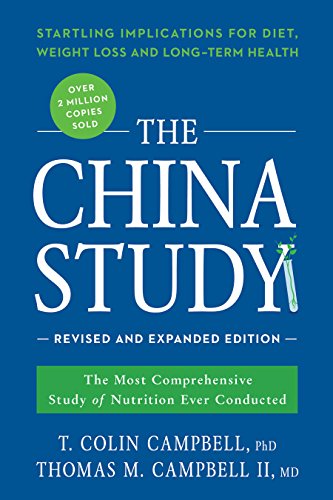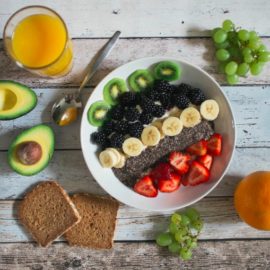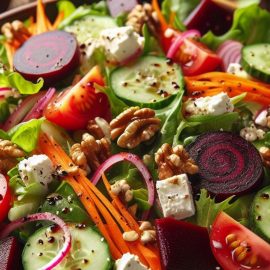

This article is an excerpt from the Shortform summary of "The China Study" by Colin Campbell. Shortform has the world's best summaries of books you should be reading.
Like this article? Sign up for a free trial here .
What is the whole food, plant-based diet for weight loss? Is it effective?
The whole food, plant-based diet for weight loss is a way of eating that eliminates animal products and focuses on whole plant foods such as fruits, vegetables, and grains. It’s also known as the WFPB weight loss diet. The diet was popularized by The China Study authors T. Colin Campbell and Thomas M. Campbell.
We’ll cover why WFPB weight loss diet is effective and how to implement it.
Why Is the Whole Food, Plant-Based Diet for Weight Loss Effective?
We’ve heard it before: Diet and exercise are the keys to weight loss. But we may not have tried a WFPB weight loss diet.
Studies show that a plant-based diet is effective for long-term weight loss. For example, vegetarians and vegans weigh five to thirty pounds less than their meat-eating fellows. Additionally, BMI decreases the longer you’ve been a vegetarian or vegan.
Participants in intervention studies who ate low-fat, whole-food, primarily plant-based diets:
- Lost two to five pounds in 12 days.
- Lost ten pounds in three weeks.
- Lost 16 pounds in 12 weeks.
- And lost 24 pounds in a year.
Reasons a WFPB Weight Loss Diet Is Effective
Reason #1
The whole food, plant-based diet for weight loss is relatively simple, compared with other diet plans.
You don’t have to count calories. You don’t have to calculate the percentage of carbohydrates, fat, and protein you eat. There aren’t any points. And you can eat as much as you want, as long as the foods are whole and plant-based.
Reason #2
On the whole food, plant-based diet for weight loss, you won’t be hungry and therefore tempted to cheat.
Even if your aim is to lose weight, you shouldn’t starve yourself. Over time, hunger sends a signal to your body to slow your metabolism to conserve energy. This means you burn less fat.
Even when WFPB weight-loss study participants ate fewer calories, they were fuller than meat-eaters because they ate a larger volume of food. Fruits, vegetables, and whole grains are full of fiber, which keeps you feeling satisfied.
Some studies show that WFPB weight-loss participants eat more calories than meat-eaters. But they’re still slimmer. Plant-eaters have a higher resting metabolism, meaning they burn more calories as heat rather than storing them as body fat.
Reason #3
On the whole food, plant-based diet for weight loss, you’ll want to exercise more.
In his studies with rats, Campbell and his team found that animals fed 5% casein diets exercised twice as much on the first day of the experiment as animals fed 20% casein diets. The first group continued to exercise more throughout the study.
Why Weight Loss Might Elude You on a Plant-Based Diet
Reason #1
You’re eating too many refined foods, including chips, candy, pastries, and pasta.
Be aware that being vegan is not the same as following a WFPB weight-loss diet. You can be a vegan and live on potato chips and Oreos. The WF in WFPB, whole foods, is just as important as the PB, plant-based. You likely won’t lose much weight if you substitute junk-food products for animal products.
Reason #2
You don’t exercise.
Any diet is most effective when paired with regular physical activity.
Reason #3
You have a genetic predisposition for being overweight.
This isn’t an excuse to eat whatever you want. Diet and exercise are still effective. But for certain people, losing weight is more challenging than for others.
Exercise
Studies show that exercising for 15-45 minutes a day, every day, will help you lose 11-18 pounds and keep those pounds off. Daily chores like grocery shopping and vacuuming count—you can burn 100-800 calories per activity. Exercise is an important supplement to the whole food, plant-based diet for weight loss.
Principles: How to Lose Weight on a Plant-Based Diet
The Campbells distill their research findings and the findings of hundreds of other nutrition and disease studies into eight basic principles of the whole food, plant-based diet for weight loss.
WFPB Principle #1: Genes alone don’t cause disease and weight issues—we have considerable control over which genes get expressed.
Genes only affect us when they’re activated, and diet is one of the biggest triggers of gene activation. This explains why, in populations made up of people who share a genetic heritage, disease rates vary widely. Some of these people are eating more foods that trigger the expression of genes that lead to disease. Researchers can actually turn “bad” genes on and off in mice by altering the amount of animal protein they feed them.
WFPB Principle #2: Almost any nutrient you can find in animal-based foods, you can find in a healthier form in plant-based foods.
Plant foods have more of almost every nutrient, including fiber, vitamins, minerals, and antioxidants. Animal foods have fewer nutrients and more fat. The only exception to this principle is vitamin B12, which is only present in animal foods.
WFPB Principle #3: Various nutrients work together to achieve health.
No single nutrient is responsible for good health. What matters most is how the various nutrients in foods work together to create change in the body and maintain good health. This is why eating whole foods rather than taking nutrition supplements is so important, which brings us to Principle #4.
WFPB Principle #4: Avoid supplements—get your nutrients from food, not pills.
Supplements are problematic because they’re poorly regulated, often have side effects, and aren’t always effective. Further, the way nutrients function in the body is complex, and it’s not always clear whether certain benefits come from a single nutrient or from the whole food, so you’re better off eating the whole food.
WFPB Principle #5: Good nutrition works holistically with physical activity, mental and emotional health, and our environment.
Positive lifestyle changes work together and build off one another to promote health. For example, eating well gives us more energy. Having more energy makes it easier to exercise more. Exercising more promotes mental and emotional health. When we’re in a better mood, we eat healthier meals, and the cycle continues.
Recommendations for Eating a WFPB Weight-Loss Diet
Recommendations for succeeding with a whole food, plant-based diet for weight loss include the following:
- Eat plant-based proteins. These come in the forms of fruits, vegetables, and whole grains. Eat as much as you want, as long as what you’re eating is plant-based and unrefined.
- Avoid animal-based proteins to decrease your risk of heart disease, cancer, diabetes, and kidney stones, among other illnesses and health issues. Animal-based proteins are those in meat, fish, eggs, and dairy.
- Eat a variety of fruits and vegetables to increase your antioxidant intake and protect yourself against free radicals. This also ensures you’re getting all the essential amino acids for healthy growth and increased strength.
- Eat 10 extra grams of fiber a day. This is the amount of fiber in a cup of raspberries or peas. A cup of beans has more than 10 grams. Get your fiber from real foods, not from supplements.
- Eat a high-carb, rather than a low-carb, diet. But make sure you’re getting your carbohydrates from whole, not refined, foods.
- Don’t spend time, money, or energy on weight-loss programs that promise quick fixes.
- Exercise 15-45 minutes a day, every day.
- For general disease prevention, get vitamin D by spending 15-30 minutes in the sun every few days.
- Eliminate saturated fat from your diet. Saturated fats are generally found in animal products. Foods with especially high amounts include beef, pork, poultry skins, hot dogs, bacon, lunch meats, butter, lard, high-fat dairy, and fried foods.
- Don’t be moderate. Try going “cold turkey” on animal products for a month.
Use these principles and guidelines to meet your goals with the whole food-plant-based diet for weight loss.
———End of Preview———

Like what you just read? Read the rest of the world's best summary of "The China Study" at Shortform . Learn the book's critical concepts in 20 minutes or less .
Here's what you'll find in our full The China Study summary :
- Why animal proteins (meat, milk) might cause cancer, diabetes, and other diseases
- Why the medical institution is structured to hide the truth about disease and food
- The precise diet you'll need to eat to live longer and feel happier






